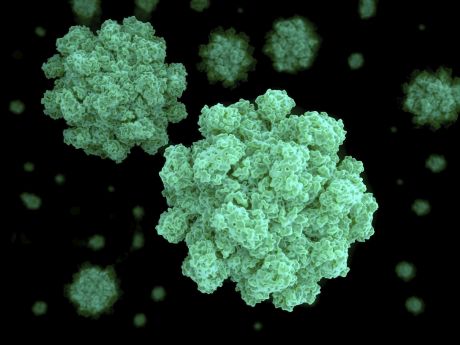Following the granting of a young British girl’s instructions to be cryogenically preserved so she can be revived in the future when a cure for cancer exists, there has been intense debate inside and outside the scientific community on both the viability of cryogenic freezing but also on the ethical issues thrown up by the procedure. Once again, it raises the centuries-old question that defines the conflict between modern science and ethics: Even if we could do something, should we?
EU-funded researchers have found that the body clock breaks down when light and temperature are out of sync, affecting activity levels.
US-based researchers have published a paper detailing their findings that a person’s chances of falling ill from a new strain of flu are at least partly determined by the first strain they ever encountered as a child.
Three EU-funded projects – NEUWALK, WALK AGAIN and E-WALK – have contributed to the development of a wireless ‘brain-spinal interface’ that bypasses spinal cord injuries and restores intentional walking movement to a temporarily paralysed leg.
A multinational team of researchers working under the EU-funded IMMUNOCORE project have discovered a new genetic defect that results in the body’s inability to successfully fight infection.
Research funded jointly by the European Research Council (ERC) and Alzheimer’s Research UK has demonstrated that the crippling neurodegenerative disease could be stopped by an injection into the memory centres of the brain.
Wearable robots that can anticipate and react to users’ movement in real time could dramatically improve mobility assistance and rehabilitation tools.
A pioneering new trial offers new hope in the fight against HIV after a patient treated with a new therapy appears to have no trace of the virus in their blood. Although experts remain cautious, this novel treatment may allow for a new front to be opened in the ongoing battle against the disease.
In a new paper, researchers from the University of Southampton, UK, and members of the EU-funded RAMP project, have demonstrated how memristors could help aid the development of more precise and affordable neuroprosthetics and bioelectric medicines.
EU-funded researchers have made significant progress in identifying promising pathways that could lead them towards developing an HIV vaccine.
EU-funded researchers have pioneered a new bone regeneration therapy that promises to significantly improve bone repair and provide a realistic solution for patients who require partial bone replacement.
The current lack of a treatment proven effective against ‘Huntington’s disease’ (HD) is leaving one in every 10 000 people with psychiatric, movement, feeding and communication problems that are very difficult to live with. An EU consortium believes it has found the long-sought after cure and is getting very close to its first preclinical studies.
For Parkinson’s disease (PD) patients whose symptoms cannot be controlled by medication, ‘Deep brain stimulation’ (DBS) may be the only hope. While DBS is generally considered to be safe, side effects related to the stimulation may occur in some cases, including numbness or tingling sensations, muscle tightness, speech or balance problems and unwanted mood changes. The IMPACT project has set out to counter these side-effects by bringing DBS to the next level.
An EU-funded project has made significant advances in treating a common form of childhood leukaemia, potentially saving thousands of young lives.
Launched in January 2016, the EU Covenant on Demographic Change is committed to creating environments that support active and healthy ageing through the exchange of best practices. The AFE-INNOVNET project, which aimed to set up this covenant, managed to bring together 29 partners from 18 countries.
Strangely enough, cancer patients across the world seem to have come to terms with the fact that the most effective treatment against cancer - chemotherapy - actually destroys their immune system. In Latvia, however, a breakthrough virotherapy called Rigvir has been doing wonders since 2004. This new treatment, which breaks down cancer cells, simulates the immune system and promotes cancer cell suicide, will soon be brought to the rest of Europe partly thanks to EU support under Horizon 2020.
The company continues to make good progress, a little less than a month after having received Fast Track designation from the Food and Drug Administration (FDA) for its QR-010 molecule. Co-funded under H2020, QR-010 is expected to treat cystic fibrosis (CF) patients who carry the common ∆F508 mutation — that is, 70 % of CF patients.
EU-funded researchers have examined new ways of rapidly detecting infectious pathogens - such as rabies and influenza - in order to prevent pandemics.
With the start of the 2016 Summer Olympic Games in Rio de Janeiro, the use of the ancient ‘cupping’ technique by various athletes, to supposedly improve their recovery time and allow for better performance, has been one of the most commented upon aspects of the Games thus far. However, scientists are divided over whether or not the technique has actual physical benefits beyond the creation of a placebo effect.
ANGLE plc’s Parsortix, which was granted a European patent in March 2016, harvests circulating cancer cells from blood for further medical analysis. Its use is an essential step in research under the GANNET53 project, which bets on a second generation Hsp90 inhibitor to improve metastatic ovarian cancer survival rates.
EU-funded research has found that we are more susceptible to infection at certain times of the day as our natural body clock affects the ability of viruses to replicate and spread between cells.

Recent advances in genomic characterisation help identify biomarkers for cancer prognosis and potential therapeutic targets. Understanding the molecular changes linked to liver cancer development enable the design of novel targeted therapies.

Neurons in our brain are crucial for information processing but their study is a complex endeavour. EU funded researchers developed optogenetic tools to overcome associated technical issues.

European researchers worked on novel anti-retroviral drugs against HIV. Their deliverables offer enhanced protection against virus transmission.

Arrhythmias are abnormal cardiac electrical rhythms that are difficult to predict and potentially life threatening. Current therapies include antiarrhythmic drugs and implantable cardioverter-defibrillator (ICD) devices that have limited efficacy.



